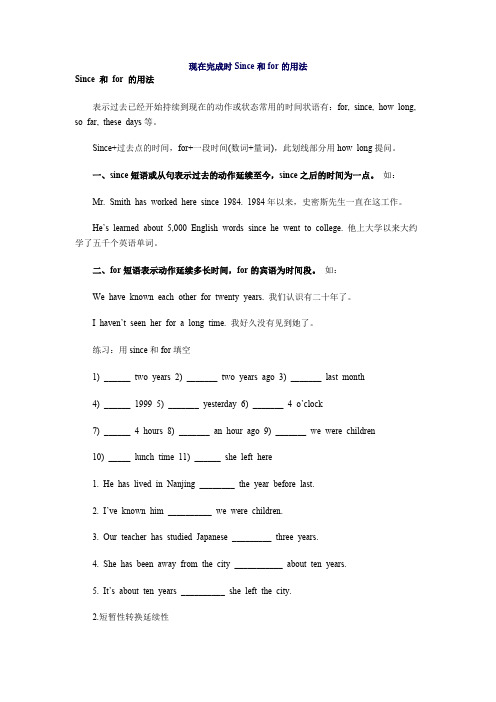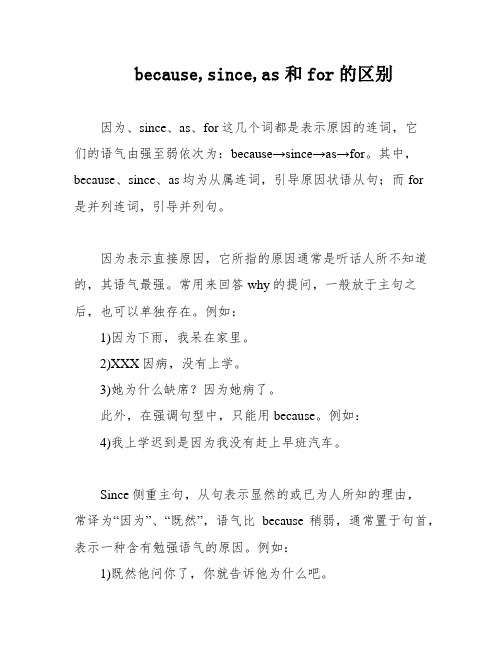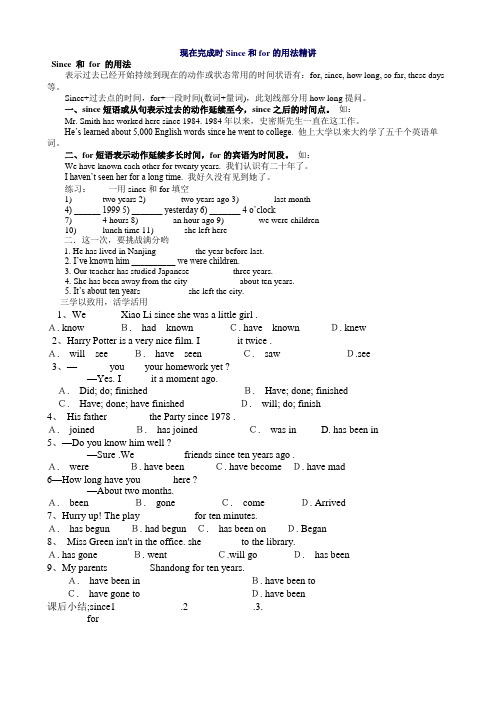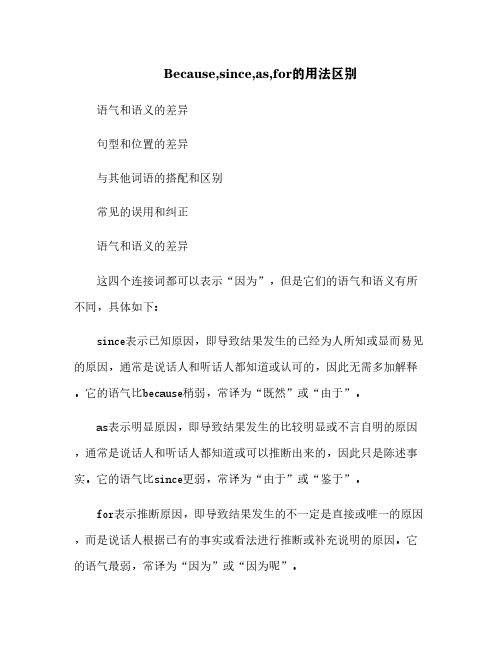Since_和_for_的用法及区别
现在完成时Since和for的用法

现在完成时Since和for的用法Since 和for 的用法 表示过去已经开始持续到现在的动作或状态常用的时间状语有:for, since, how long, so far, these days等。
Since+过去点的时间,for+一段时间(数词+量词),此划线部分用how long提问。
一、since短语或从句表示过去的动作延续至今,since之后的时间为一点。
如: Mr. Smith has worked here since 1984. 1984年以来,史密斯先生一直在这工作。
He’s learned about 5,000 English words since he went to college. 他上大学以来大约学了五千个英语单词。
二、for短语表示动作延续多长时间,for的宾语为时间段。
如: We have known each other for twenty years. 我们认识有二十年了。
I haven’t seen her for a long time. 我好久没有见到她了。
练习:用since和for填空 1) ______ two years 2) _______ two years ago 3) _______ last month 4) ______ 1999 5) _______ yesterday 6) _______ 4 o’clock 7) ______ 4 hours 8) _______ an hour ago 9) _______ we were children 10) _____ lunch time 11) ______ she left here 1. He has lived in Nanjing ________ the year before last. 2. I’ve known him __________ we were children. 3. Our teacher has studied Japanese _________ three years. 4. She has been away from the city ___________ about ten years. 5. It’s about ten years __________ she left the city. 2.短暂性转换延续性 ①arrive at/in sw. get to/reach sw. come/go/move to sw. →be in sw./at school/at home/on the farm/be here/be there 1) He got to Beijing five minutes ago. He ________ _________ _________ Beijing for _________ _________. 2) I moved to the USA last year. I ________ ________ __________ the USA since __________ __________. 3) I went home yesterday. I _______ ________ _________ home for _________ __________. 4) They came here last week. They _________ _________ here since _________ __________. ②come/go back, return →be back come/go out →be out 1) He came out two years ago. He _________ __________ _________ for __________ __________. 2) We return to Fuzhou yesterday. We ________ ________ _________ to Fuzhou since __________. ③become →be 1) I became a teacher in 2000. I ________ __________ a teacher for _________ _________. 2) The river became dirty last year. The river _________ _________ dirty for _________ __________. ④close →be closed open →be open 1) The shop closed two hours ago. The shop ________ _________ _________ for _________ _________. 2) The door opened at six in the morning. The door ________ ________ ________ for six hours. ⑤get up →be up die →be dead leave sw. →be away from sw. fall asleep/get tot sleep →be asleep finish/end →be over marry →be married 1) I got up two hours ago. I ________ ________ ________ since ________ ________. 2) He left Fuzhou just now. He _______ ________ ________ _________ Fuzhou for five minutes. 3) My grandpa died in 2002. My grandpa _______ _______ ________for _______ ________. 4) The meeting finished at six. The meeting ________ ______ ______ for six hours. 5) I got to sleep two hours ago. I ________ _________ _________ since _________ __________. 6) They married in 1990. They ________ _________ __________since _________. ⑥start/begin to do sth. →do sth. begin →be on 1) I began to teach at this school in 1995. I ____ ____ at this school since ____. 2) The film began two minutes ago. The film ____ ____ ____ for ____ ____. ⑦borrow →keep lose →not have buy →have put on →wear catch/get a cold →have a cold get to know →know 1) They borrowed it last week. They _________ _________ it since __________ __________. 2) I bought a pen two hours ago. I _________ _________ a pen for ________ __________. 3) I got to know him last year. I _________ __________ him since __________ __________. 4) I put on my glasses three years ago. I __________ __________ my glasses for _________ _________. ⑧have/has gone to →have been in 1) He has gone to Beijing. He ____ ____ _____ Beijing for two days. ⑨join the league/the Party/the army →be a league/a Party member/a soldier →be a member of the league/the Party →be in the league/the Party/the army 1) He joined the league in 2002. He ________ _________ a _________ _________ for two years. He ________ __________ a __________ ___________ the __________ for two years. He ____________ ___________ ___________ the league for two years. 2) My brother joined the army two years ago. My brother __________ __________ a ___________ for ___________ ___________. My brother ___________ ___________ in ____________ ___________ for two years. 3.汉译英 1)这本字典我已买了三年了。
because,since,as和for的区别

because,since,as和for的区别因为、since、as、for这几个词都是表示原因的连词,它们的语气由强至弱依次为:because→since→as→for。
其中,because、since、as均为从属连词,引导原因状语从句;而for是并列连词,引导并列句。
因为表示直接原因,它所指的原因通常是听话人所不知道的,其语气最强。
常用来回答why的提问,一般放于主句之后,也可以单独存在。
例如:1)因为下雨,我呆在家里。
2)XXX因病,没有上学。
3)她为什么缺席?因为她病了。
此外,在强调句型中,只能用because。
例如:4)我上学迟到是因为我没有赶上早班汽车。
Since侧重主句,从句表示显然的或已为人所知的理由,常译为“因为”、“既然”,语气比because稍弱,通常置于句首,表示一种含有勉强语气的原因。
例如:1)既然他问你了,你就告诉他为什么吧。
2)既然大家都到齐了,我们就出发吧!3)我日语懂得不多,因而听不懂对话。
As是常用词,它表示的原因是双方已知的事实或显而易见的原因,或者理由不是很重要,含义与since相同,但语气更弱,没有since正式,常译为“由于,鉴于”。
从句说明原因,主句说明结果,主从并重。
例如:1)我们都喜欢她,因为她善良。
2)因为我感冒了,所以没去上课。
以上就是关于because、since、as、for这几个连词表示原因的用法和区别的介绍。
As Xiaowang was unprepared。
we had to leave without him.XXX "for" is similar to "because," but it often provides n that has not been ned in the us context。
"For" does not indicate a direct cause。
现在完成时Since和for的用法

现在完成时Since和for的用法精讲Since 和for 的用法表示过去已经开始持续到现在的动作或状态常用的时间状语有:for, since, how long, so far, these days 等。
Since+过去点的时间,for+一段时间(数词+量词),此划线部分用how long提问。
一、since短语或从句表示过去的动作延续至今,since之后的时间点。
如:Mr. Smith has worked here since 1984. 1984年以来,史密斯先生一直在这工作。
He’s learned about 5,000 English words since he went to college. 他上大学以来大约学了五千个英语单词。
二、for短语表示动作延续多长时间,for的宾语为时间段。
如:We have known each other for twenty years. 我们认识有二十年了。
I haven’t seen her for a long time. 我好久没有见到她了。
练习:一用since和for填空1) ______ two years 2) _______ two years ago 3) _______ last month4) ______ 1999 5) _______ yesterday 6) _______ 4 o’clock7) ______ 4 hours 8) _______ an hour ago 9) _______ we were children10) _____ lunch time 11) ______ she left here二.这一次,要挑战满分哟1. He has lived in Nanjing ________ the year before last.2. I’ve known him __________ we were children.3. Our teacher has studied Japanese _________ three years.4. She has been away from the city ___________ about ten years.5. It’s about ten year s __________ she left the city.三学以致用,活学活用1、We ______ Xiao Li since she was a little girl .A. know B. had known C. have known D. knew2、Harry Potter is a very nice film. I_______ it twice .A. will see B. have seen C. saw D.see3、—______ you ___ your homework yet ?—Yes. I _____ it a moment ago.A. Did; do; finished B. Have; done; finishedC. Have; done; have finished D. will; do; finish4、His father ______ the Party since 1978 .A. joined B. has joined C. was in D. has been in5、—Do you know him well ?—Sure .We _________ friends since ten years ago .A. were B. have been C. have become D. have mad6—How long have you ____ here ?—About two months.A. been B. gone C. come D. Arrived7、Hurry up! The play __________ for ten minutes.A. has begun B. had begun C. has been on D. Began8、Miss Green isn't in the office. she _______ to the library.A. has gone B. went C.will go D. has been9、My parents ______ Shandong for ten years.A. have been in B. have been toC. have gone to D. have been课后小结;since1_____________.2_____________.3. _____________for_____________。
since, for, because, as, now that 表原因的用法区别

since, for, because, as, now that 表原因的用法区别in that通常用now that,是既然的意思。
since,for,because,now that的用法和区别:1.since(既然)语气较弱,强调已知的事实。
例:Since you can't answer the question, I'll ask someone else.既然你回答不出这个问题,我就问别人了。
2. for(因为)的用法:for是并列连词,表示推断的原因,或对前一分句补充说明理由。
例:It must be morning for the birds are singing.一定是清晨了,因为鸟儿在叫。
3. because (因为)的用法:because通常表示直接的原因。
because引导的从句表示直接而明确的原因和理由,表示按因果关系的推断,语气很强,用来回答why的问题, 一般位于主句之后。
例:We couldn't go out because it was too cold. 因为天气太冷,我们不能外出。
4. now that(既然)的用法:now that同since相似,语气较弱,强调人们已知的事实。
例:Now that you are busy, let me do it for you.既然你忙,就让我给你做吧。
5. as意为“因为、由于”,语气比because弱,所引导的从句表示的是不言而喻、显而易见的原因和理由,其从句一般放在主句前,如:As it was late ,we came back soon.(由于时间很晚了,我们很快就回来。
)区别:since和now that,表示事物发展的自然结果,特别是当对方大概已经了解其原因的情况下使用,表示既成事实的原因一般位于主句之前。
注意:for是并列连词,引出的原因较间接,似乎是事后所想到的补充解释的理由,只陈述一般推断的理由,不一定表示产生结果的必然原因,主要放在两个并列句之间。
Because,since,as,for的用法区别

Because,since,as,for的用法区别语气和语义的差异句型和位置的差异与其他词语的搭配和区别常见的误用和纠正语气和语义的差异这四个连接词都可以表示“因为”,但是它们的语气和语义有所不同,具体如下:since表示已知原因,即导致结果发生的已经为人所知或显而易见的原因,通常是说话人和听话人都知道或认可的,因此无需多加解释。
它的语气比because稍弱,常译为“既然”或“由于”。
as表示明显原因,即导致结果发生的比较明显或不言自明的原因,通常是说话人和听话人都知道或可以推断出来的,因此只是陈述事实。
它的语气比since更弱,常译为“由于”或“鉴于”。
for表示推断原因,即导致结果发生的不一定是直接或唯一的原因,而是说话人根据已有的事实或看法进行推断或补充说明的原因。
它的语气最弱,常译为“因为”或“因为呢”。
举例说明:I stayed at home because itrned.(我呆在家里是因为下雨了。
)这里because表示下雨是我呆在家里的直接原因,可能是听话人不知道下雨了,所以需要解释。
Since you are so busy, I won't bother you anymore.(既然你这么忙,我就不再打扰你了。
)这里since表示你很忙是我不再打扰你的已知原因,可能是说话人和听话人都知道你很忙,所以无需多说。
As he is a teacher, he knows alot.(由于他是老师,他知道很多。
)这里as表示他是老师是他知道很多的明显原因,可能是说话人和听话人都认为老师知道很多,所以只是陈述事实。
He must be ill, for he lookspale.(他一定生病了,因为他看起来很苍白。
)这里for表示他看起来很苍白是他生病了的推断原因,可能是说话人根据他苍白的面色进行推测或补充说明。
句型和位置的差异这四个连接词在句型和位置上也有一些差异,具体如下:because为从属连词,引导原因状语从句,从句可以放在主句之前或之后,但如果放在主句之前,则要用逗号隔开;如果单独存在,则要用冒号引出。
since--for--because--as--now-that-表原因的用法区别

since, for, because, as, now that 表原因的用法区别in that通常用now that,是既然的意思。
since,for,because,now that的用法和区别:(既然)语气较弱,强调已知的事实。
例:Since you can't answer the question, I'll ask someone else.既然你回答不出这个问题,我就问别人了。
2. for(因为)的用法:for是并列连词,表示推断的原因,或对前一分句补充说明理由。
例:It must be morning for the birds are singing.一定是清晨了,因为鸟儿在叫。
3. because (因为)的用法:]because通常表示直接的原因。
because引导的从句表示直接而明确的原因和理由,表示按因果关系的推断,语气很强,用来回答why的问题, 一般位于主句之后。
例:We couldn't go out because it was too cold. 因为天气太冷,我们不能外出。
4. now that(既然)的用法:now that同since相似,语气较弱,强调人们已知的事实。
例:Now that you are busy, let me do it for you.既然你忙,就让我给你做吧。
5. as意为“因为、由于”,语气比because弱,所引导的从句表示的是不言而喻、显而易见的原因和理由,其从句一般放在主句前,如:As it was late ,we came back soon.(由于时间很晚了,我们很快就回来。
)区别:since和now that,表示事物发展的自然结果,特别是当对方大概已经了解其原因的情况下使用,表示既成事实的原因一般位于主句之前。
注意:for是并列连词,引出的原因较间接,似乎是事后所想到的补充解释的理由,只陈述一般推断的理由,不一定表示产生结果的必然原因,主要放在两个并列句之间。
since, for, because, as, now that 表原因的用法区别
since, for, because, as, now that 表原因的用法区别in that通常用now that,是既然的意思。
since,for,because,now that的用法和区别:1.since(既然)语气较弱,强调已知的事实。
例:Since you can't answer the question, I'll ask someone else.既然你回答不出这个问题,我就问别人了。
2. for(因为)的用法:for是并列连词,表示推断的原因,或对前一分句补充说明理由。
例:It must be morning for the birds are singing.一定是清晨了,因为鸟儿在叫。
3. because (因为)的用法:because通常表示直接的原因。
because引导的从句表示直接而明确的原因和理由,表示按因果关系的推断,语气很强,用来回答why的问题, 一般位于主句之后。
例:We couldn't go out because it was too cold. 因为天气太冷,我们不能外出。
4. now that(既然)的用法:now that同since相似,语气较弱,强调人们已知的事实。
例:Now that you are busy, let me do it for you.既然你忙,就让我给你做吧。
5. as意为“因为、由于”,语气比because弱,所引导的从句表示的是不言而喻、显而易见的原因和理由,其从句一般放在主句前,如:As it was late ,we came back soon.(由于时间很晚了,我们很快就回来。
)区别:since和now that,表示事物发展的自然结果,特别是当对方大概已经了解其原因的情况下使用,表示既成事实的原因一般位于主句之前。
注意:for是并列连词,引出的原因较间接,似乎是事后所想到的补充解释的理由,只陈述一般推断的理由,不一定表示产生结果的必然原因,主要放在两个并列句之间。
since和for的用法口诀
since和for的用法口诀
1. “Since 时间点呀,要记牢,就像火车有个起始站。
比如说 Since 1990,那就是从 1990 年开始呢!”
2. “For 时间段哟,别弄混,好像一段长长的旅程。
像 for two hours,就
是长达两个小时呀!”
3. “哎呀呀,since 后面跟时间点,这很关键呀!就好比你从哪一天开始踏上征途,since yesterday,从昨天起呀!”
4. “for 就是一段时间啦,多形象!for a week,这不就是一个星期那么长的时间嘛!”
5. “since 一出现,时间点就在那哟,想想 since last year,不就是从去年开始嘛,多简单!”
6. “for 在这里,时间段稳稳的,for several days,好几天呢,你记住了没!”
我觉得记住这些用法口诀,对大家正确使用 since 和 for 会很有帮助呢!。
八年级英since和for的用法
D.living
4.I _____ him since I came back.
A.don't see
B.haven't seen
B.didn't see
D.am seeing
用since或空
1. He has lived in Guangzhou __s_i_n_c_e__ last year
我们认识有二十年了。
I haven’t seen her for a long time.
我好久没有见到她了。
用since或for填空
_s_i_n_c_e_ 1984
__fo_r___ ten years
__f_o_r__ a day __f_o_r__ two weeks
_s_i_n_c_e_ I was ill _s_i_n_c_e_ 8:00 this morning
since和for的用法
Since+过去的时间点/过去从句,for+时间段, 对这些部分提问时用how long。
--How long have you learned English? --Since 2004./For 10years.
1,since短语或从句表示过去的动作延续至 今,since之后的时间为具体时间。如:
2. I’ve known him s_i_n_c_e____ we were children.
3. Our teacher has studied Japanese ___fo__r ____ three years.
4. She has been away from the city ___fo_r___ about ten years.
since与for的用法 (2)
since与for的用法一、介绍Since和for是英语中两个常用的时间状语,用来表示一段时间的起点和持续时间。
在使用这两个词组时需要注意它们的不同含义和用法。
本文将详细介绍since 与for的用法,并给出一些例句加以说明。
二、since的用法1. since作为连词,引导从句表示因果关系或原因。
例如:Since it is raining outside, we decided to stay at home.由于外面下雨,我们决定待在家里。
2. since可以作为介词,后接具体某一点或事件的时间。
这种情况下,其后跟随一个动作或状态的起始时间。
例如:I have been learning French since 2015.自从2015年以来我就开始学习法语。
3. sinceno later than(非常早地;十分及时),在此情况下,主要强调动作开始的确切时间。
They arrived promptly, just my getting out of bed.他们到得很准时,也就是在我刚起床之际。
三、for的用法1. for可以表示“持续”的时间段,在此情况下后面通常跟着一个表示长短时间的名词短语。
例如:They have been living in London for three years.他们已经在伦敦居住了三年了。
2. for也可以表示“到了什么时间”,在此情况下后面跟着一个表示截止时间的短语。
例如:I will be on vacation for two weeks.我将度假两周。
3. for可以用来表示“换成”的时间,后接时间段或具体日期。
She worked as a teacher for five years before becoming a writer.她在成为作家之前担任教师工作了五年。
四、since和for的搭配根据上面所介绍的since和for的分别用法,我们也可以使用它们来表达动作开始以及持续的时间。
- 1、下载文档前请自行甄别文档内容的完整性,平台不提供额外的编辑、内容补充、找答案等附加服务。
- 2、"仅部分预览"的文档,不可在线预览部分如存在完整性等问题,可反馈申请退款(可完整预览的文档不适用该条件!)。
- 3、如文档侵犯您的权益,请联系客服反馈,我们会尽快为您处理(人工客服工作时间:9:00-18:30)。
Since 和 for 的用法及区别:一,since 的四种用法1,since + 过去一个时间点(如具体的年、月、日期、钟点、ago . 1990 , last month , half past six I have been here since 1990. 1990起,我一直在这儿。
2,since+ 一段时间+agoI h a v e b e e n h e r e s i n c e f i v e m o n t h s a g o 。
自从五个月前,我已经在这儿了。
3,since+从句GreatChanges have taken place since you left. 自从你走后,已经发生了很大的变化。
4,It is +一段时间+since 从句I t i s t w o y e a r s s i n c e I b e c a m e a n E n g l i s h t e a c h e r. 我成为英语老师有两年了。
二,Since 和for 区别1,Since +时间点,具体时间“自从、以来,从、、、以后” 用来说明动作起始时间I have been in Beijing since 2010.2,For + 时间段,用来说明动作延续时间长度,因此句中的谓语动词,也应该是延续性动词。
I have been in Beijing for one year 。
We have learnt English for about three years.I have been here for 3 days. (对)I have arrived here for 3 days.(误)短暂性动词的用法特征1.终止性动词可用来表示某一动作完成,因此可用于现在完成时。
如:The train has arrived.火车到了。
Have you joined the computer group?你加入电脑小组了吗?2.终 止 性 动 词表 示 的 动 作 极 其 短 暂 , 不 能 持 续。
因此,不 可 与 表 示 一 段 时 间 的 状 语用 (只限肯定式)。
如:(1)他死了三年了。
误: He has died for three years. 正: He has been dead for three years. 正: He died three years ago. 正: It is three years since he died. 正: Three years has passed since he died. (2)他来这儿五天了。
误:He has come here for five days. 正:He has been here for five days. 正:He came here five days ago. 正:It is five days since he came here. 正:Five days has passed since he came here.练习:用since和for填空1) ______ two years 2) _______ two years ago 3) _______ last month4) ______ 1999 5) _______ yesterday 6) _______ 4 o’clock7) ______ 4 hours 8) _______ an hour ago 9) _______ we were children 10) _____ lunch time 11) ______ she left here1. He has lived in Nanjing ________ the year before last.2. I’ve known him __________ we were children.3. Our teacher has studied Japanese _________ three years.4. She has been away from the city ___________ about ten years.5. It’s about ten years __________ she left the city.2.短暂性转换延续性①arrive at/in sw. get to/reach sw. come/go/move to sw.→ be in sw./at school/at home/on the farm/be here/be there1) He got to Beijing five minutes ago.He ________ _________ _________ Beijing for _________ _________.2) I moved to the USA last year.I ________ ________ __________ the USA since __________ __________.3) I went home yesterday.I _______ ________ _________ home for _________ __________.4) They came here last week.They _________ _________ here since _________ __________.②come/go back, return → be back come/go out → be out1) He came out two years ago.He _________ __________ _________ for __________ __________.2) We return to Fuzhou yesterday.We ________ ________ _________ to Fuzhou since __________.③become → be1) I became a teacher in 2000.I ________ __________ a teacher for _________ _________.2) The river became dirty last year.The river _________ _________ dirty for _________ __________.④close → be closed open → be open1) The shop closed two hours ago.The shop ________ _________ _________ for _________ _________.2) The door opened at six in the morning.The door ________ ________ ________ for six hours.⑤get up → be up die → be deadleave sw. → be away from sw.fall asleep/get tot sleep → be asleepfinish/end → be over marry → be married1) I got up two hours ago.I ________ ________ ________ since ________ ________.2) He left Fuzhou just now.He _______ ________ ________ _________ Fuzhou for five minutes.3) My grandpa died in 2002.My grandpa _______ _______ ________for _______ ________.4) The meeting finished at six.The meeting ________ ______ ______ for six hours.5) I got to sleep two hours ago.I ________ _________ _________ since _________ __________.6) They married in 1990.They ________ _________ __________since _________.⑥start/begin to do sth. → do sth. begin → be on1) I began to teach at this school in 1995.I ____ ____ at this school since ____.2) The film began two minutes ago.The film ____ ____ ____ for ____ ____.⑦borrow → keep lose → not have buy → have put on → wearcatch/get a cold → have a cold get to know → know1) They borrowed it last week.They _________ _________ it since __________ __________.2) I bought a pen two hours ago.I _________ _________ a pen for ________ __________.3) I got to know him last year.I _________ __________ him since __________ __________.4) I put on my glasses three years ago.I __________ __________ my glasses for _________ _________.⑧have/has gone to → have been in1) He has gone to Beijing.He ____ ____ _____ Beijing for two days.⑨join the league/the Party/the army→ be a league/a Party member/a soldier→ be a member of the league/the Party→ be in the league/the Party/the army1) He joined the league in 2002.He ________ _________ a _________ _________ for two years.He ________ __________ a __________ ___________ the __________ for two years. He ____________ ___________ ___________ the league for two years.2) My brother joined the army two years ago.My brother __________ __________ a ___________ for ___________ ___________. My brother ___________ ___________ in ____________ ___________ for two years.3.汉译英1)这本字典我已买了三年了。
